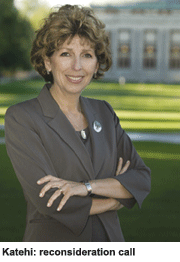China and other Asian countries are responding to the global recession with massive public investment in higher education while Western nations cut university budgets, an international conference has heard. Among the speeches at the World Universities Forum in Davos, Switzerland (January) were two that highlighted contrasting government and public attitudes to higher education in China and the US.
 Linda Katehi, chancellor of the University of California, Davis, looked at the future of the state’s publicly funded university system in the wake of a 20 percent budget cut over the past year. She warned that without increased federal and state investment, America’s public research universities faced the “shrunken, caste-bound future of the privatised university”.
Linda Katehi, chancellor of the University of California, Davis, looked at the future of the state’s publicly funded university system in the wake of a 20 percent budget cut over the past year. She warned that without increased federal and state investment, America’s public research universities faced the “shrunken, caste-bound future of the privatised university”.
On the other hand, David Strangway, who co-chaired the task force on innovation and environment for the China Council on International Co-operation on Environment and Development, presented a contrasting vision of higher education investment in China, particularly in the low-carbon economy. “They are investing heavily in research and development and building a lot of university-based capacity,” he told Times Higher Education (THE).
Bill Cope, director of Common Ground Publishing, which organises the World Universities Forum with the University of Illinois’ College of Education, said a key theme to emerge from the conference was China’s “huge, structured public investment in higher education at a time when there is disinvestment in northern Europe and North America”. Higher education investment is a key part of China’s economic-stimulus package, he noted.
His analysis was similar to that of Simon Marginson, professor of higher education at the University of Melbourne, who was a keynote speaker at the forum. Writing in THE, he describes the higher education policies of Asian and Western governments as “polar opposites”. “In Far Eastern nations, public faith in educational investment is increasing while the West withdraws,” he writes.
Prof. Katehi made the case for challenging that approach in a keynote speech titled ‘Safeguarding the future: a call for renewed commitment to public higher education in challenging economic times’. She contrasted the University of California’s current plight — budget cuts of $637 million (Rs.2,930 crore) have prompted a 32 percent rise in tuition fees — with its founding ideals as a “public good to be cherished and financially supported by its citizenry”.
“It is time for the US to reconsider leaving planning for higher education and funding of its national universities to the trepidation of short-sighted state politics,” Prof. Katehi said. “If ever the US needed to formulate a long-range master plan for the future of its higher education system, now is the time.”
In another of the forum’s keynote speeches, Jandhyala B.G. Tilak, professor of educational finance at the National University of Educational Planning and Administration, New Delhi, looked at changing definitions of the idea of the university. “Higher education is a public good, producing a huge set of wider social benefits that span social, economic, political, cultural and technological areas.” Therefore Prof. Tilak argued that “we need to expand, strengthen, re-energise and revitalise the dying public university system”. “It should be liberally funded by the state, which would guarantee enhanced levels of equitable access and improved levels of quality and excellence, producing better human beings,” he said.
(Excerpted and adapted from Times Higher Education)